外研版英语九年级上Module 2 Public holidays Unit 3 Language in use课件(32张PPT无素材)
文档属性
| 名称 | 外研版英语九年级上Module 2 Public holidays Unit 3 Language in use课件(32张PPT无素材) |
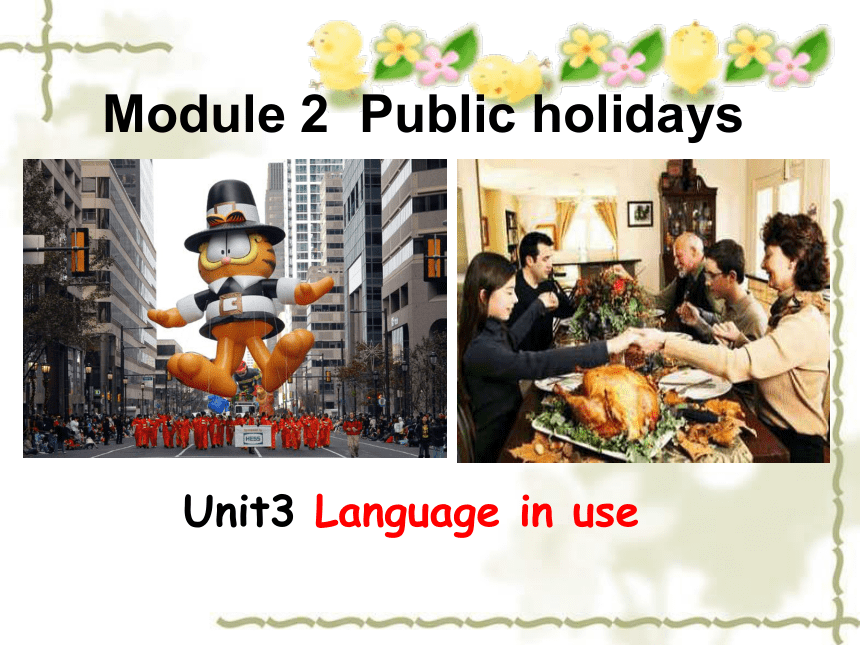
|
|
| 格式 | zip | ||
| 文件大小 | 1.4MB | ||
| 资源类型 | 教案 | ||
| 版本资源 | 外研版 | ||
| 科目 | 英语 | ||
| 更新时间 | 2020-08-01 00:00:00 | ||
图片预览

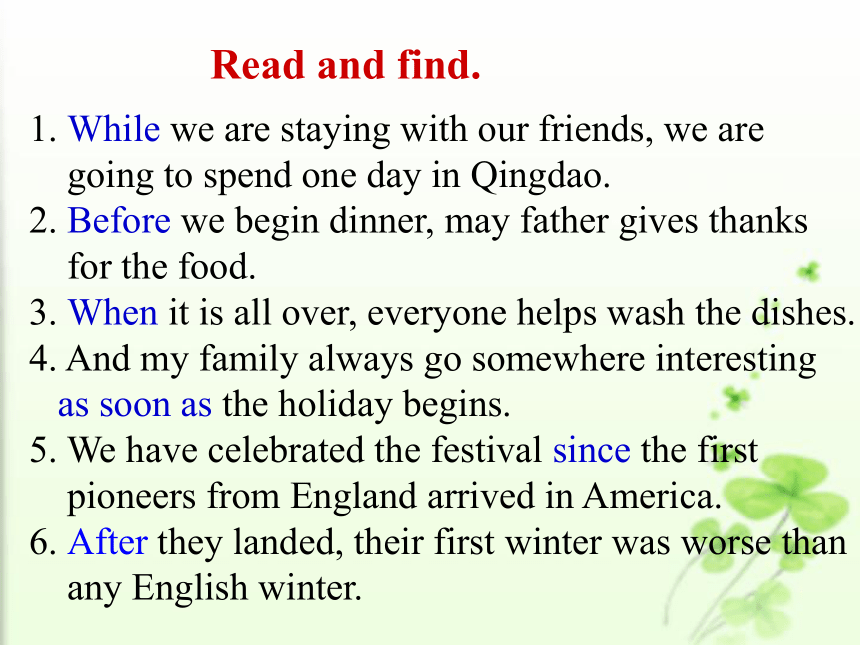
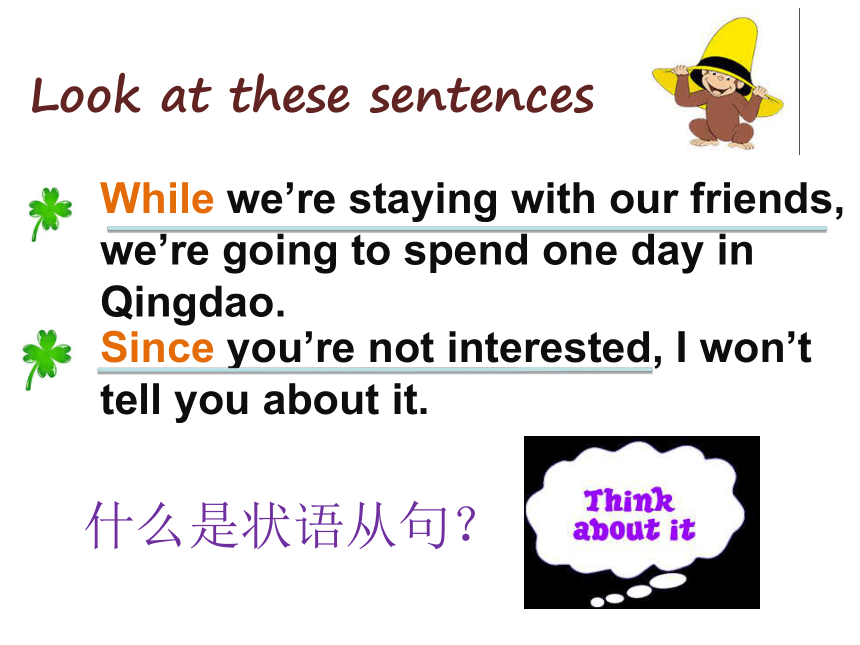
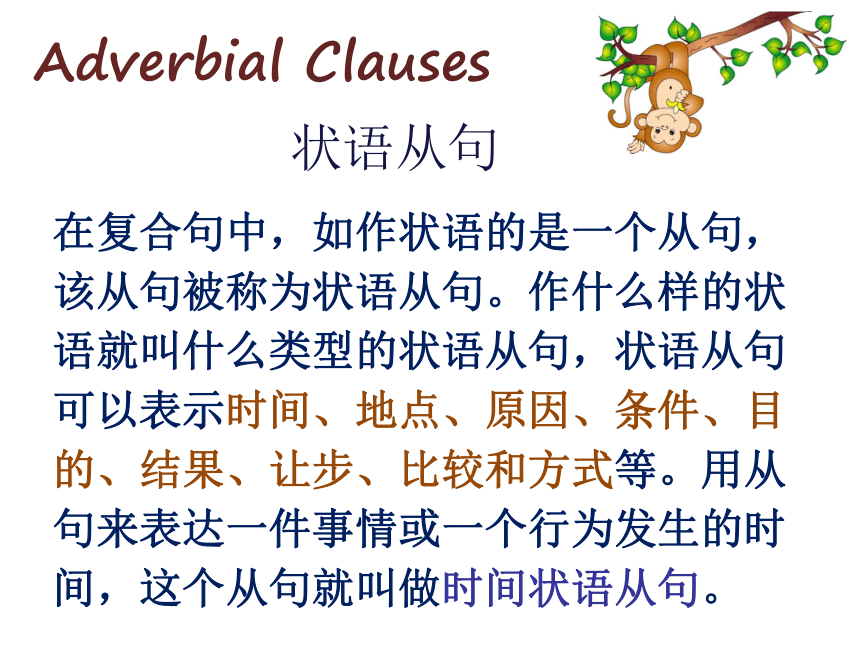


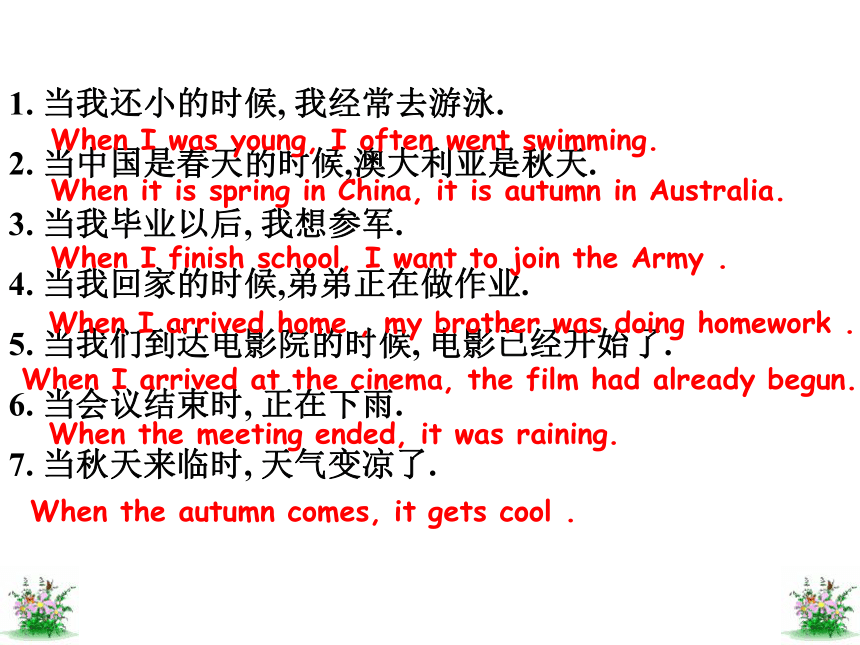
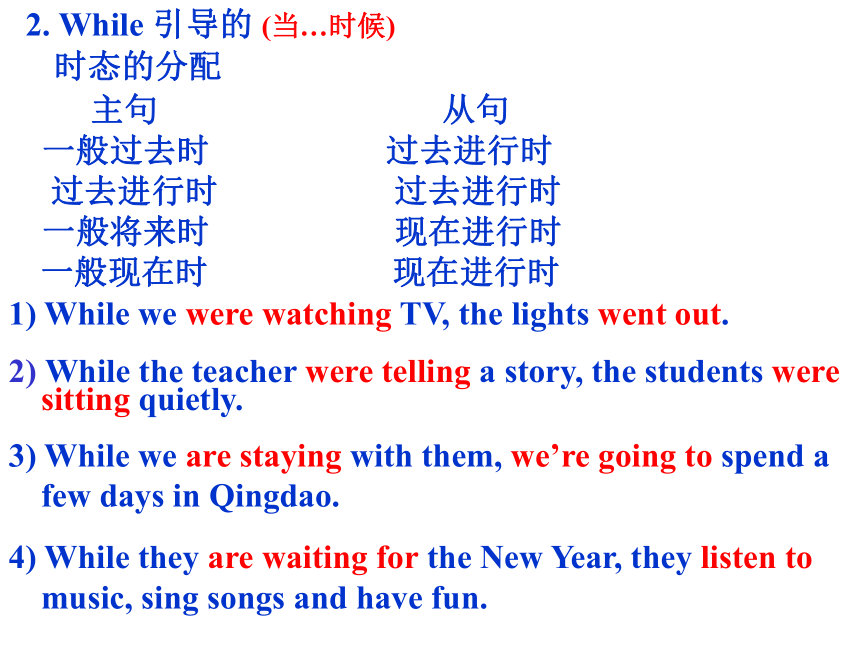
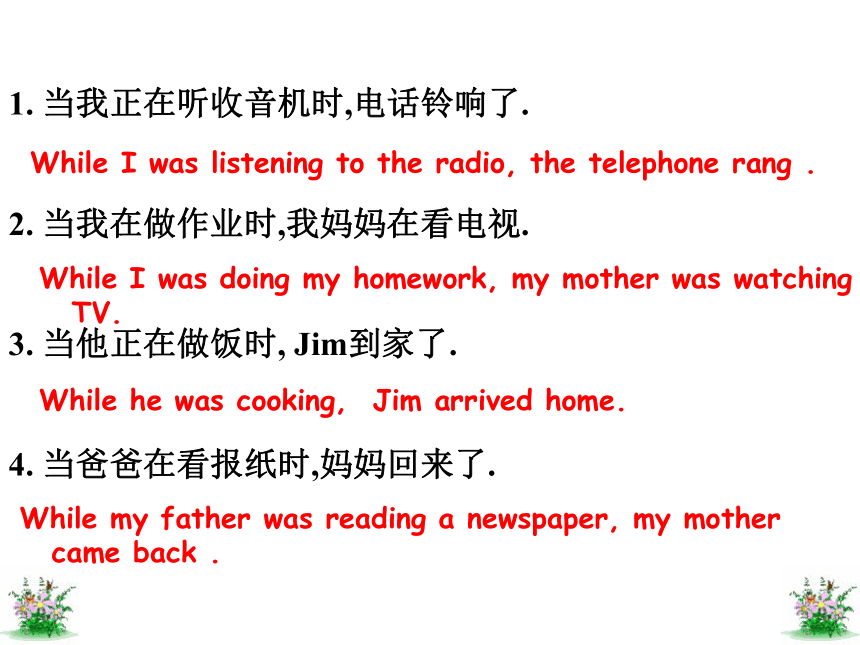
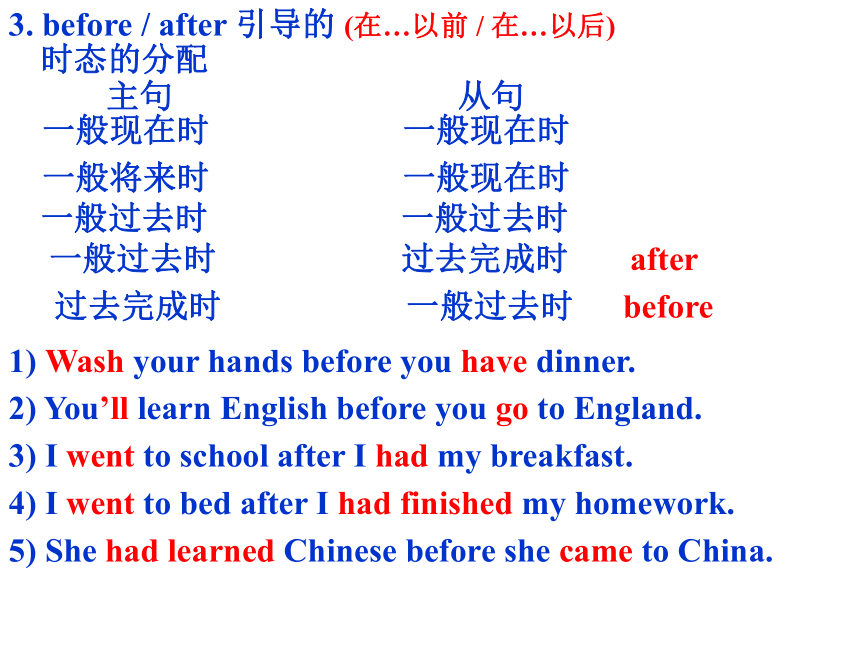
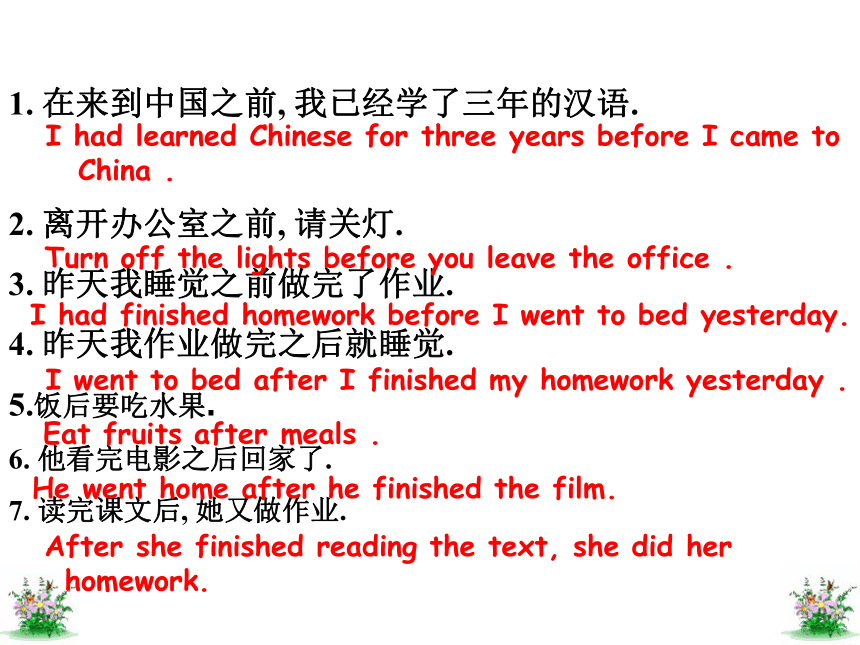
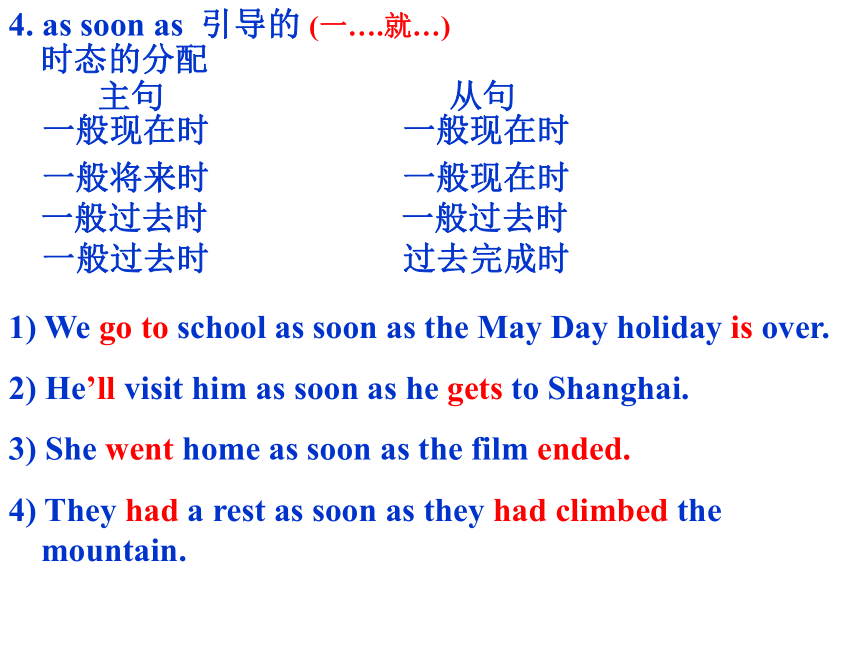
文档简介
(共32张PPT)
Module
2
Public
holidays
Unit3
Language
in
use
Read
and
find.
1.
While
we
are
staying
with
our
friends,
we
are
going
to
spend
one
day
in
Qingdao.
2.
Before
we
begin
dinner,
may
father
gives
thanks
for
the
food.
3.
When
it
is
all
over,
everyone
helps
wash
the
dishes.
4.
And
my
family
always
go
somewhere
interesting
as
soon
as
the
holiday
begins.
5.
We
have
celebrated
the
festival
since
the
first
pioneers
from
England
arrived
in
America.
6.
After
they
landed,
their
first
winter
was
worse
than
any
English
winter.
While
we’re
staying
with
our
friends,
we’re
going
to
spend
one
day
in
Qingdao.
Since
you’re
not
interested,
I
won’t
tell
you
about
it.
Look
at
these
sentences
什么是状语从句?
Adverbial
Clauses
状语从句
在复合句中,如作状语的是一个从句,该从句被称为状语从句。作什么样的状语就叫什么类型的状语从句,状语从句可以表示时间、地点、原因、条件、目的、结果、让步、比较和方式等。用从句来表达一件事情或一个行为发生的时间,这个从句就叫做时间状语从句。
I.
Grammar
时间状语从句
1.
When
引导的(当….时候)
时态的分配
主句
从句
一般现在时
一般现在时
一般将来时
一般现在时
一般过去时
一般过去时
过去进行时
一般过去时
一般过去时
过去进行时
过去完成时
一般过去时
1)
When
spring
comes,
the
weather
gets
warm.
2)
When
I
finish
my
school
,
I’ll
go
to
London.
3)
When
I
was
in
collage,
I
often
climbed
the
mountain.
4)
When
she
left
the
office,
it
was
raining.
5)
When
we
were
having
lunch
,
the
telephone
rang.
6)When
they
arrived
at
the
cinema,
the
film
had
begun.
Exercise
1.
当我还小的时候,
我经常去游泳.
2.
当中国是春天的时候,澳大利亚是秋天.
3.
当我毕业以后,
我想参军.
4.
当我回家的时候,弟弟正在做作业.
5.
当我们到达电影院的时候,
电影已经开始了.
6.
当会议结束时,
正在下雨.
7.
当秋天来临时,
天气变凉了.
When
I
was
young,
I
often
went
swimming.
When
it
is
spring
in
China,
it
is
autumn
in
Australia.
When
I
finish
school,
I
want
to
join
the
Army
.
When
I
arrived
home
,
my
brother
was
doing
homework
.
When
I
arrived
at
the
cinema,
the
film
had
already
begun.
When
the
meeting
ended,
it
was
raining.
When
the
autumn
comes,
it
gets
cool
.
2.
While
引导的
(当…时候)
一般过去时
过去进行时
时态的分配
主句
从句
一般将来时
现在进行时
过去进行时
过去进行时
一般现在时
现在进行时
1)
While
we
were
watching
TV,
the
lights
went
out.
2)
While
the
teacher
were
telling
a
story,
the
students
were
sitting
quietly.
3)
While
we
are
staying
with
them,
we’re
going
to
spend
a
few
days
in
Qingdao.
4)
While
they
are
waiting
for
the
New
Year,
they
listen
to
music,
sing
songs
and
have
fun.
Exercise
1.
当我正在听收音机时,电话铃响了.
2.
当我在做作业时,我妈妈在看电视.
3.
当他正在做饭时,
Jim到家了.
4.
当爸爸在看报纸时,妈妈回来了.
While
I
was
listening
to
the
radio,
the
telephone
rang
.
While
I
was
doing
my
homework,
my
mother
was
watching
TV.
While
he
was
cooking,
Jim
arrived
home.
While
my
father
was
reading
a
newspaper,
my
mother
came
back
.
3.
before
/
after
引导的
(在…以前
/
在…以后)
一般现在时
一般现在时
时态的分配
主句
从句
一般过去时
一般过去时
一般过去时
过去完成时
after
过去完成时
一般过去时
before
一般将来时
一般现在时
1)
Wash
your
hands
before
you
have
dinner.
2)
You’ll
learn
English
before
you
go
to
England.
3)
I
went
to
school
after
I
had
my
breakfast.
4)
I
went
to
bed
after
I
had
finished
my
homework.
5)
She
had
learned
Chinese
before
she
came
to
China.
Exercise
1.
在来到中国之前,
我已经学了三年的汉语.
2.
离开办公室之前,
请关灯.
3.
昨天我睡觉之前做完了作业.
4.
昨天我作业做完之后就睡觉.
5.饭后要吃水果.
6.
他看完电影之后回家了.
7.
读完课文后,
她又做作业.
I
had
learned
Chinese
for
three
years
before
I
came
to
China
.
Turn
off
the
lights
before
you
leave
the
office
.
I
had
finished
homework
before
I
went
to
bed
yesterday.
I
went
to
bed
after
I
finished
my
homework
yesterday
.
Eat
fruits
after
meals
.
He
went
home
after
he
finished
the
film.
After
she
finished
reading
the
text,
she
did
her
homework.
4.
as
soon
as
引导的
(一….就…)
一般现在时
一般现在时
时态的分配
主句
从句
一般过去时
一般过去时
一般过去时
过去完成时
一般将来时
一般现在时
1)
We
go
to
school
as
soon
as
the
May
Day
holiday
is
over.
2)
He’ll
visit
him
as
soon
as
he
gets
to
Shanghai.
3)
She
went
home
as
soon
as
the
film
ended.
4)
They
had
a
rest
as
soon
as
they
had
climbed
the
mountain.
Exercise
1.
我会一看见他就把消息告诉他.
2.
上星期我一到上海就去东方明珠塔/外滩.
3.
他们一到,我们就开始开会.
4.
图书馆一开门,人们就进去.
I
will
tell
him
the
news
as
soon
as
I
see
him.
I
visited
the
Oriental
Pearl
Tower/the
bund
as
soon
as
I
arrived
in
Shanghai
last
Monday.
We
started
the
meeting
as
soon
as
they
arrived.
People
enter
the
library
as
soon
as
it
opens.
5.
until
引导的
(直到….为止)
一般现在时
一般现在时
时态的分配
主句
从句
一般过去时
一般过去时
一般将来时
一般现在时
1)
She
often
stays
here
until
9
o'clock
/
her
mother
comes
.
2)
He’ll
wait
for
her
until
she
comes
back
from
school.
3)
Alice
read
English
until
the
teacher
stopped
her
yesterday.
表示主句所表达的动作一直延续到until
所表达的时间或动作开始才结束,主句谓语动词用延续性动词
5.
not
until
引导的
(直到….才,在…之前,不…)
一般现在时
一般现在时
时态的分配
主句
从句
一般过去时
一般过去时
一般将来时
一般现在时
1)
Don’t
get
off
the
bus
until
it
stops
.
2)
He
won’t
leave
until
she
comes
back
from
the
school.
3)
They
didn’t
sweep
the
floor
until
the
teacher
asked
them
to
do
it
yesterday.
表示主句所表达的动作一直到until
所表达的时间或动作结束才开始,主句谓语动词可用延续性和结束性动词
Exercise
1.
直到你告诉我,我才知道这个消息.
2.
昨天他一直等到他妹妹回来.
3.
车停之前不要下车.
4.
他将一直练习唱歌直到老师回来.
I
didn’t
know
the
message
until
you
tell
me.
He
waited
for
his
sister
until
she
came
back
yesterday.
Don’t
get
off
the
bus
until
it
stops.
He
will
practice
singing
until
the
teach
comes
back.
Complete
the
sentences
with
the
correct
form
of
the
words
or
expression
in
the
box.
There
may
be
more
than
one
answer.
after
as
soon
as
since
until
while
1
________our
friends
arrived,
we
all
went
to
the
square.
2
________they
were
watching
TV,
we
listened
to
music
and
sang
traditional
songs.
1
After
While
3.
__________it
was
twelve
o’clock,
we
all
shouted
“Happy
New
Year”.
As
soon
as
4.
We
stayed
there
________
she
arrived.
until
5.
He
has
made
much
progress
________
he
started
to
learn
English
last
month.
since
Betty:
Daming:
Ok,
let’s
go.
It’s
better
to
be
early
and
get
there
(2)
_____.
Yes,
we
don’t
want
to
get
there
(3)
____.
Oh,
Daming!
You
always
think
about
eating.
Well,
it’s
something
to
do
(4)
_____.
Don’t
you
want
to
make
a
whish
for
the
New
Year(5)
_____.
No,
it’s
ok.
I’ll
make
it
(6)
______.
Betty:
Daming:
Daming:
Betty:
2
c
a
f
d
e
Complete
the
conversation
with
the
expressions
in
the
box.
Betty:
Daming:
When
are
we
going
to
the
party?
We’re
waiting
for
you.
We
can
go
(1)
____.
b
Complete
the
passage
with
the
words
in
the
box.
before
until
when
while
Christmas
is
a
happy
holiday.
(1)______
it
come,
people
celebrate
it
in
different
ways.
To
many
people
in
the
world,
this
time
of
year
is
the
season
for
giving
and
receiving
present.
Children
think
that
Father
Christmas
waits
(2)______they
are
asleep
and
then
comes
in
and
leaves
presents
for
them.
4
When
until
They
should
like
him
to
come
(3)_______
they
fall
asleep,
so
they
can
see
him.
They
do
not
know
that
it
is
their
parents
who
put
the
presents
at
the
end
of
their
beds
(4)
______
they
are
sleeping.
before
while
Complete
the
passage
with
the
expressions
in
the
box.
As
well
get
together
have
a
picnic
spend
some
time
take
a
vacation
the
end
of
I
always
count
down
the
days
until
(1)
_________
the
term,
because
then
it
is
the
beginning
of
the
holiday.
We
have
several
weeks
off
school
and
we
can
(2)
__________________doing
our
favourite
thing.
For
example,
we
can
(3)
_____________with
friends.
5
the
end
of
spend
some
time
get
together
When
the
weather
is
good,
we
can
(4)
_______________in
the
park
and
play
games
(5)
___________.
Sometimes
we
can(6)
________________
in
a
different
part
of
the
country.
For
me,
I
always
like
enjoying
myself
on
the
beach
in
the
south,
but
it
depends
on
the
weather.
I
just
hope
it
will
be
sunny
when
it
is
time
for
the
next
holiday,
I
can’t
wait!
have
a
picnic
as
well
take
a
vacation
Complete
the
conversations
with
the
sentences
in
the
box.
a)
Enjoy
yourself!
b)
Good
luck!
c)
Have
a
nice
trip!
d)
Well
done!
1
-
we’re
going
to
visit
the
Grand
Canyon
with
Aunt
Li
for
the
holiday.
-
___________
2
-
I’m
going
to
take
a
vacation
tomorrow.
-
___________
6
c
a
3
-
I’m
taking
my
driving
test
next
week.
-
___________
b
4
-
I’ve
just
run
one
thousand
metres
and
beaten
everyone!
-
___________
d
1.It
is
time
to
do
sth.
该做某事的时候了.
1)
It’s
time
to
have
dinner.
2)
It’s
time
to
watch
TV.
2.
It’s
time
for
sth.
It’s
time
for
dinner.
It’s
time
for
the
meeting.
3.
It’s
time
for
sb
to
do
sth.
It’s
time
for
us
to
go
to
school.
It’s
time
for
them
to
read
English.
4.
It’s
a
time
for
sb.
to
do
sth
II.
Sentence
Structures
It’s
a
time
for
the
children
to
give
thanks
for
their
fathers
二.
词汇
1.
while
conj.1)
当…
时候
While
they
were
leaving
,
the
postman
arrived.
The
lights
went
out
while
we
were
watching
TV.
2)
与…同时
(表示两个动作同时进行)
I
was
washing
my
face
while
my
brother
was
having
breakfast.
3)
“…而”
表示对照关系
She
is
rich
while
her
sister
is
very
poor.
He
asked
his
father,
“
Why
can
hens
hatch
the
chicken
while
I
can’t.”
n.
一段时间
After
a
while
,
we
went
on
working.
Useful
phrases
1.
公共假日
2.
成立
3.
中华人民共和国
4.
国庆节
5.
三天假期
6.
…..的末尾
7.
独立日
8.
休假
9.
所有种类
10.
去度假
public
holiday
be
founded
the
People’s
Republic
of
China
National
Day
a
three-day
holiday
the
end
of
Independence
Day
have
….off
all
kinds
of
take
a
vacation
Useful
phrases
11.
很开心
12.
一….就…
13.
演讲
14.
教某人做某事
15.
国旗
16.
特别的事
17.
野餐
18.
玩的愉快
19.
在公园
20.
一个两天的假期
have
great
fun
as
soon
as
make
speeches
teach
sb.
to
do
sth.
national
flags
something
special
have
a
picnic
have
great
fun
in
public
parks
a
two-day
holiday
Useful
phrases
21.
摆放桌子
22.
为…而感谢
23.
丰富的,充足的
24.
也
25.
庆祝节日
26.
感恩节
27.
为…许愿
28.
考虑
29.
以不同的方式
30.
入睡
31.除…..
以外(还有)
lay
the
table
give
thanks
for
….
plenty
of
as
well
celebrate
the
festival
Thanksgiving
Day
make
a
wish
for
think
about
in
different
ways
fall
asleep
apart
from
Exercise
一.用所给的词填空
1.I
was
doing
my
homework
______
my
parents
were
washing
2.______
we
cross
the
road,
we
should
look
both
sides
3.
________
September
comes,
we’ll
go
back
to
school.
4.
I
went
to
bed
________
I
finished
my
homework.
5.
He
didn’t
leave
________
his
mother
came
back.
6.
The
baby
stopped
crying
__________
he
saw
his
mother.
until
when
while
as
soon
as
before
after
二.选择
1.
When
we
arrived
at
the
country,
we
____
a
beautiful
lake.
A.
see
B.
sees
C.
saw
D.
have
seen
2.
They
won’t
leave
until
they
____
the
work.
A.
finishes
B.
finished
C.
have
finished
D.
finish
3.
While
they
______
the
New
Year,
they
listen
to
the
music.
A.
wait
for
B.
waited
for
C.
are
waiting
for
D.
waits
for
4.
They’ll
visit
their
teacher
as
soon
as
they
______
there.
A.
got
B.
gets
C.
get
D.
getting
5.
She
________
the
information
before
she
went
to
the
film.
A.
read
B.
reads
C.
has
read
D.
had
read
6.
Turn
off
the
lights
before
you
______
the
office.
A.
leave
B.
leaves
C.
left
D.
leaving
7.
He
worked
until
it
_____
very
late.
A.
be
B.
is
C.
was
D.
are
8.
When
I
finish
my
school,
I_______
to
America.
A.
go
B.
went
C.
will
go
D.
goes
9.
After
he
______
his
work
,
he
went
to
bed.
A.
finishes
B.
finished
C.
had
finished
D.
finish
10.
She
asked
me
the
question
as
soon
as
I
______
back.
A.
come
B.
comes
C.
came
D.
coming
11.
While
I
was
watching
TV,
my
mother
_______.
A.
cooks
B.
cooked
C.
cooking
D.
was
cooking
13.
When
we
arrived
at
the
bus
stop,
the
bus
_______.
A.
leaves
B.
left
C.
leaving
D.
had
left
14.
Don’t
drink
the
water
until
it
____
cooler.
A.
be
B.
is
C.
was
D.
are
二.介词填空
1.
We
have
seven
days
_____
for
the
May
Day
holiday
2.
We
celebrate
May
Day
_____
May
1st.
3.
All
countries
celebrate
the
New
Year
___
different
way.
4.
It
depends
______
the
weather.
5.
____
New
Year’s
Eve,
we
Chinese
have
a
big
dinner.
6.
Out
_____
the
old
year
and
in
______
the
new.
7.
While
we
were
waiting
___
the
New
Year,
we
have
fun.
8.
Many
people
make
resolutions
____
the
New
Year.
9.
They
write
_____
a
list
of
things.
10.
She
say
goodbye
_____
her
teacher.
off
on
in
on
On
with
with
for
for
down
to
Module
2
Public
holidays
Unit3
Language
in
use
Read
and
find.
1.
While
we
are
staying
with
our
friends,
we
are
going
to
spend
one
day
in
Qingdao.
2.
Before
we
begin
dinner,
may
father
gives
thanks
for
the
food.
3.
When
it
is
all
over,
everyone
helps
wash
the
dishes.
4.
And
my
family
always
go
somewhere
interesting
as
soon
as
the
holiday
begins.
5.
We
have
celebrated
the
festival
since
the
first
pioneers
from
England
arrived
in
America.
6.
After
they
landed,
their
first
winter
was
worse
than
any
English
winter.
While
we’re
staying
with
our
friends,
we’re
going
to
spend
one
day
in
Qingdao.
Since
you’re
not
interested,
I
won’t
tell
you
about
it.
Look
at
these
sentences
什么是状语从句?
Adverbial
Clauses
状语从句
在复合句中,如作状语的是一个从句,该从句被称为状语从句。作什么样的状语就叫什么类型的状语从句,状语从句可以表示时间、地点、原因、条件、目的、结果、让步、比较和方式等。用从句来表达一件事情或一个行为发生的时间,这个从句就叫做时间状语从句。
I.
Grammar
时间状语从句
1.
When
引导的(当….时候)
时态的分配
主句
从句
一般现在时
一般现在时
一般将来时
一般现在时
一般过去时
一般过去时
过去进行时
一般过去时
一般过去时
过去进行时
过去完成时
一般过去时
1)
When
spring
comes,
the
weather
gets
warm.
2)
When
I
finish
my
school
,
I’ll
go
to
London.
3)
When
I
was
in
collage,
I
often
climbed
the
mountain.
4)
When
she
left
the
office,
it
was
raining.
5)
When
we
were
having
lunch
,
the
telephone
rang.
6)When
they
arrived
at
the
cinema,
the
film
had
begun.
Exercise
1.
当我还小的时候,
我经常去游泳.
2.
当中国是春天的时候,澳大利亚是秋天.
3.
当我毕业以后,
我想参军.
4.
当我回家的时候,弟弟正在做作业.
5.
当我们到达电影院的时候,
电影已经开始了.
6.
当会议结束时,
正在下雨.
7.
当秋天来临时,
天气变凉了.
When
I
was
young,
I
often
went
swimming.
When
it
is
spring
in
China,
it
is
autumn
in
Australia.
When
I
finish
school,
I
want
to
join
the
Army
.
When
I
arrived
home
,
my
brother
was
doing
homework
.
When
I
arrived
at
the
cinema,
the
film
had
already
begun.
When
the
meeting
ended,
it
was
raining.
When
the
autumn
comes,
it
gets
cool
.
2.
While
引导的
(当…时候)
一般过去时
过去进行时
时态的分配
主句
从句
一般将来时
现在进行时
过去进行时
过去进行时
一般现在时
现在进行时
1)
While
we
were
watching
TV,
the
lights
went
out.
2)
While
the
teacher
were
telling
a
story,
the
students
were
sitting
quietly.
3)
While
we
are
staying
with
them,
we’re
going
to
spend
a
few
days
in
Qingdao.
4)
While
they
are
waiting
for
the
New
Year,
they
listen
to
music,
sing
songs
and
have
fun.
Exercise
1.
当我正在听收音机时,电话铃响了.
2.
当我在做作业时,我妈妈在看电视.
3.
当他正在做饭时,
Jim到家了.
4.
当爸爸在看报纸时,妈妈回来了.
While
I
was
listening
to
the
radio,
the
telephone
rang
.
While
I
was
doing
my
homework,
my
mother
was
watching
TV.
While
he
was
cooking,
Jim
arrived
home.
While
my
father
was
reading
a
newspaper,
my
mother
came
back
.
3.
before
/
after
引导的
(在…以前
/
在…以后)
一般现在时
一般现在时
时态的分配
主句
从句
一般过去时
一般过去时
一般过去时
过去完成时
after
过去完成时
一般过去时
before
一般将来时
一般现在时
1)
Wash
your
hands
before
you
have
dinner.
2)
You’ll
learn
English
before
you
go
to
England.
3)
I
went
to
school
after
I
had
my
breakfast.
4)
I
went
to
bed
after
I
had
finished
my
homework.
5)
She
had
learned
Chinese
before
she
came
to
China.
Exercise
1.
在来到中国之前,
我已经学了三年的汉语.
2.
离开办公室之前,
请关灯.
3.
昨天我睡觉之前做完了作业.
4.
昨天我作业做完之后就睡觉.
5.饭后要吃水果.
6.
他看完电影之后回家了.
7.
读完课文后,
她又做作业.
I
had
learned
Chinese
for
three
years
before
I
came
to
China
.
Turn
off
the
lights
before
you
leave
the
office
.
I
had
finished
homework
before
I
went
to
bed
yesterday.
I
went
to
bed
after
I
finished
my
homework
yesterday
.
Eat
fruits
after
meals
.
He
went
home
after
he
finished
the
film.
After
she
finished
reading
the
text,
she
did
her
homework.
4.
as
soon
as
引导的
(一….就…)
一般现在时
一般现在时
时态的分配
主句
从句
一般过去时
一般过去时
一般过去时
过去完成时
一般将来时
一般现在时
1)
We
go
to
school
as
soon
as
the
May
Day
holiday
is
over.
2)
He’ll
visit
him
as
soon
as
he
gets
to
Shanghai.
3)
She
went
home
as
soon
as
the
film
ended.
4)
They
had
a
rest
as
soon
as
they
had
climbed
the
mountain.
Exercise
1.
我会一看见他就把消息告诉他.
2.
上星期我一到上海就去东方明珠塔/外滩.
3.
他们一到,我们就开始开会.
4.
图书馆一开门,人们就进去.
I
will
tell
him
the
news
as
soon
as
I
see
him.
I
visited
the
Oriental
Pearl
Tower/the
bund
as
soon
as
I
arrived
in
Shanghai
last
Monday.
We
started
the
meeting
as
soon
as
they
arrived.
People
enter
the
library
as
soon
as
it
opens.
5.
until
引导的
(直到….为止)
一般现在时
一般现在时
时态的分配
主句
从句
一般过去时
一般过去时
一般将来时
一般现在时
1)
She
often
stays
here
until
9
o'clock
/
her
mother
comes
.
2)
He’ll
wait
for
her
until
she
comes
back
from
school.
3)
Alice
read
English
until
the
teacher
stopped
her
yesterday.
表示主句所表达的动作一直延续到until
所表达的时间或动作开始才结束,主句谓语动词用延续性动词
5.
not
until
引导的
(直到….才,在…之前,不…)
一般现在时
一般现在时
时态的分配
主句
从句
一般过去时
一般过去时
一般将来时
一般现在时
1)
Don’t
get
off
the
bus
until
it
stops
.
2)
He
won’t
leave
until
she
comes
back
from
the
school.
3)
They
didn’t
sweep
the
floor
until
the
teacher
asked
them
to
do
it
yesterday.
表示主句所表达的动作一直到until
所表达的时间或动作结束才开始,主句谓语动词可用延续性和结束性动词
Exercise
1.
直到你告诉我,我才知道这个消息.
2.
昨天他一直等到他妹妹回来.
3.
车停之前不要下车.
4.
他将一直练习唱歌直到老师回来.
I
didn’t
know
the
message
until
you
tell
me.
He
waited
for
his
sister
until
she
came
back
yesterday.
Don’t
get
off
the
bus
until
it
stops.
He
will
practice
singing
until
the
teach
comes
back.
Complete
the
sentences
with
the
correct
form
of
the
words
or
expression
in
the
box.
There
may
be
more
than
one
answer.
after
as
soon
as
since
until
while
1
________our
friends
arrived,
we
all
went
to
the
square.
2
________they
were
watching
TV,
we
listened
to
music
and
sang
traditional
songs.
1
After
While
3.
__________it
was
twelve
o’clock,
we
all
shouted
“Happy
New
Year”.
As
soon
as
4.
We
stayed
there
________
she
arrived.
until
5.
He
has
made
much
progress
________
he
started
to
learn
English
last
month.
since
Betty:
Daming:
Ok,
let’s
go.
It’s
better
to
be
early
and
get
there
(2)
_____.
Yes,
we
don’t
want
to
get
there
(3)
____.
Oh,
Daming!
You
always
think
about
eating.
Well,
it’s
something
to
do
(4)
_____.
Don’t
you
want
to
make
a
whish
for
the
New
Year(5)
_____.
No,
it’s
ok.
I’ll
make
it
(6)
______.
Betty:
Daming:
Daming:
Betty:
2
c
a
f
d
e
Complete
the
conversation
with
the
expressions
in
the
box.
Betty:
Daming:
When
are
we
going
to
the
party?
We’re
waiting
for
you.
We
can
go
(1)
____.
b
Complete
the
passage
with
the
words
in
the
box.
before
until
when
while
Christmas
is
a
happy
holiday.
(1)______
it
come,
people
celebrate
it
in
different
ways.
To
many
people
in
the
world,
this
time
of
year
is
the
season
for
giving
and
receiving
present.
Children
think
that
Father
Christmas
waits
(2)______they
are
asleep
and
then
comes
in
and
leaves
presents
for
them.
4
When
until
They
should
like
him
to
come
(3)_______
they
fall
asleep,
so
they
can
see
him.
They
do
not
know
that
it
is
their
parents
who
put
the
presents
at
the
end
of
their
beds
(4)
______
they
are
sleeping.
before
while
Complete
the
passage
with
the
expressions
in
the
box.
As
well
get
together
have
a
picnic
spend
some
time
take
a
vacation
the
end
of
I
always
count
down
the
days
until
(1)
_________
the
term,
because
then
it
is
the
beginning
of
the
holiday.
We
have
several
weeks
off
school
and
we
can
(2)
__________________doing
our
favourite
thing.
For
example,
we
can
(3)
_____________with
friends.
5
the
end
of
spend
some
time
get
together
When
the
weather
is
good,
we
can
(4)
_______________in
the
park
and
play
games
(5)
___________.
Sometimes
we
can(6)
________________
in
a
different
part
of
the
country.
For
me,
I
always
like
enjoying
myself
on
the
beach
in
the
south,
but
it
depends
on
the
weather.
I
just
hope
it
will
be
sunny
when
it
is
time
for
the
next
holiday,
I
can’t
wait!
have
a
picnic
as
well
take
a
vacation
Complete
the
conversations
with
the
sentences
in
the
box.
a)
Enjoy
yourself!
b)
Good
luck!
c)
Have
a
nice
trip!
d)
Well
done!
1
-
we’re
going
to
visit
the
Grand
Canyon
with
Aunt
Li
for
the
holiday.
-
___________
2
-
I’m
going
to
take
a
vacation
tomorrow.
-
___________
6
c
a
3
-
I’m
taking
my
driving
test
next
week.
-
___________
b
4
-
I’ve
just
run
one
thousand
metres
and
beaten
everyone!
-
___________
d
1.It
is
time
to
do
sth.
该做某事的时候了.
1)
It’s
time
to
have
dinner.
2)
It’s
time
to
watch
TV.
2.
It’s
time
for
sth.
It’s
time
for
dinner.
It’s
time
for
the
meeting.
3.
It’s
time
for
sb
to
do
sth.
It’s
time
for
us
to
go
to
school.
It’s
time
for
them
to
read
English.
4.
It’s
a
time
for
sb.
to
do
sth
II.
Sentence
Structures
It’s
a
time
for
the
children
to
give
thanks
for
their
fathers
二.
词汇
1.
while
conj.1)
当…
时候
While
they
were
leaving
,
the
postman
arrived.
The
lights
went
out
while
we
were
watching
TV.
2)
与…同时
(表示两个动作同时进行)
I
was
washing
my
face
while
my
brother
was
having
breakfast.
3)
“…而”
表示对照关系
She
is
rich
while
her
sister
is
very
poor.
He
asked
his
father,
“
Why
can
hens
hatch
the
chicken
while
I
can’t.”
n.
一段时间
After
a
while
,
we
went
on
working.
Useful
phrases
1.
公共假日
2.
成立
3.
中华人民共和国
4.
国庆节
5.
三天假期
6.
…..的末尾
7.
独立日
8.
休假
9.
所有种类
10.
去度假
public
holiday
be
founded
the
People’s
Republic
of
China
National
Day
a
three-day
holiday
the
end
of
Independence
Day
have
….off
all
kinds
of
take
a
vacation
Useful
phrases
11.
很开心
12.
一….就…
13.
演讲
14.
教某人做某事
15.
国旗
16.
特别的事
17.
野餐
18.
玩的愉快
19.
在公园
20.
一个两天的假期
have
great
fun
as
soon
as
make
speeches
teach
sb.
to
do
sth.
national
flags
something
special
have
a
picnic
have
great
fun
in
public
parks
a
two-day
holiday
Useful
phrases
21.
摆放桌子
22.
为…而感谢
23.
丰富的,充足的
24.
也
25.
庆祝节日
26.
感恩节
27.
为…许愿
28.
考虑
29.
以不同的方式
30.
入睡
31.除…..
以外(还有)
lay
the
table
give
thanks
for
….
plenty
of
as
well
celebrate
the
festival
Thanksgiving
Day
make
a
wish
for
think
about
in
different
ways
fall
asleep
apart
from
Exercise
一.用所给的词填空
1.I
was
doing
my
homework
______
my
parents
were
washing
2.______
we
cross
the
road,
we
should
look
both
sides
3.
________
September
comes,
we’ll
go
back
to
school.
4.
I
went
to
bed
________
I
finished
my
homework.
5.
He
didn’t
leave
________
his
mother
came
back.
6.
The
baby
stopped
crying
__________
he
saw
his
mother.
until
when
while
as
soon
as
before
after
二.选择
1.
When
we
arrived
at
the
country,
we
____
a
beautiful
lake.
A.
see
B.
sees
C.
saw
D.
have
seen
2.
They
won’t
leave
until
they
____
the
work.
A.
finishes
B.
finished
C.
have
finished
D.
finish
3.
While
they
______
the
New
Year,
they
listen
to
the
music.
A.
wait
for
B.
waited
for
C.
are
waiting
for
D.
waits
for
4.
They’ll
visit
their
teacher
as
soon
as
they
______
there.
A.
got
B.
gets
C.
get
D.
getting
5.
She
________
the
information
before
she
went
to
the
film.
A.
read
B.
reads
C.
has
read
D.
had
read
6.
Turn
off
the
lights
before
you
______
the
office.
A.
leave
B.
leaves
C.
left
D.
leaving
7.
He
worked
until
it
_____
very
late.
A.
be
B.
is
C.
was
D.
are
8.
When
I
finish
my
school,
I_______
to
America.
A.
go
B.
went
C.
will
go
D.
goes
9.
After
he
______
his
work
,
he
went
to
bed.
A.
finishes
B.
finished
C.
had
finished
D.
finish
10.
She
asked
me
the
question
as
soon
as
I
______
back.
A.
come
B.
comes
C.
came
D.
coming
11.
While
I
was
watching
TV,
my
mother
_______.
A.
cooks
B.
cooked
C.
cooking
D.
was
cooking
13.
When
we
arrived
at
the
bus
stop,
the
bus
_______.
A.
leaves
B.
left
C.
leaving
D.
had
left
14.
Don’t
drink
the
water
until
it
____
cooler.
A.
be
B.
is
C.
was
D.
are
二.介词填空
1.
We
have
seven
days
_____
for
the
May
Day
holiday
2.
We
celebrate
May
Day
_____
May
1st.
3.
All
countries
celebrate
the
New
Year
___
different
way.
4.
It
depends
______
the
weather.
5.
____
New
Year’s
Eve,
we
Chinese
have
a
big
dinner.
6.
Out
_____
the
old
year
and
in
______
the
new.
7.
While
we
were
waiting
___
the
New
Year,
we
have
fun.
8.
Many
people
make
resolutions
____
the
New
Year.
9.
They
write
_____
a
list
of
things.
10.
She
say
goodbye
_____
her
teacher.
off
on
in
on
On
with
with
for
for
down
to
同课章节目录
- Module 1 Wonders of the world
- Unit 1 It's more than 2,000 years old.
- Unit 2 The Grand Canyon was not just big.
- Unit 3 Language in use
- Module 2 Public holidays
- Unit 1 My family always go somewhere interesting a
- Unit 2 We have celebrated the festival since the f
- Unit 3 Language in use
- Module 3 Heroes
- Unit 1 She trained hard,so she became a great play
- Unit 2There were few doctors, so he had to work ve
- Unit 3 Language in use
- Module 4 Home alone
- Unit 1 I can look after myself, although it won’t
- Unit 2 I became so bored with their orders that I
- Unit 3 Language in use
- Module 5 Museums
- Unit 1 Don't cross that rope!
- Unit 2 If you ever go to London, make sure you vis
- Unit 3 Language in use
- Module 6 Problems
- Unit 1 If I start after dinner, I'll finish it be
- Unit 2 If you tell him the truth now, you will sho
- Unit 3 Language in use
- Revision Module A
- Module 7 Great books
- Unit 1 We're still influenced by Confucius's idea
- Unit 2 It is still read and loved.
- Unit 3 Language in use
- Module 8 Sports life
- Unit 1 Daming wasn't chosen for the team last time
- Unit 2 He was invited to competitions around the w
- Unit 3 Language in use
- Module 9 Great inventions
- Unit 1 Will computers be used more than books in t
- Unit 2 Will books be replaced by the Internet?
- Unit 3 Language in use
- Module 10 Australia
- Unit 1 I have some photos that I took in Australia
- Unit 2 The game that they like most is Australian
- Unit 3 Language in use
- Module 11 Photos
- Unit 1 He's the boy who won the photo competition
- Unit 2 The photo which we liked best was taken by
- Unit 3 Language in use
- Module 12 Save our world
- Unit 1 If everyone starts to do something, the wor
- Unit 2 Repeat these three words daily: reduce, reu
- Unit 3 Language in use
- Revision Module B
